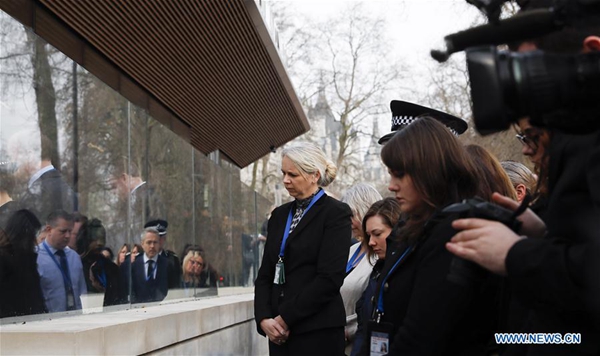Terrorism narratives in the West distorted
china.org.cn / chinagate.cn by Mitchell Blatt, March 31, 2017 Adjust font size:
|
|
|
People pay a minute's silence tribute at Scotland Yard, headquarters of London's Metropolitan Police in London, Britain, on March 23, 2017. [Xinhua/Han Yan] |
In a major Western city, a car ploughs into a crowd of pedestrians killing several. That was the scene in London on March 22. It was also the scene in Melbourne on January 20. The differences and similarities in responses say much about how the American and British media conceives of terrorism and other deadly threats.
In one case, the attacker was a drug-addled man of Greek descent who attacked for no rational reason that normal people would recognize. Dimitrious Gargasoulas left a trail of Facebook messages ranting about the "Illuminati" and hearing voices from god.
In the other case, Khalid Masood was aiming for Parliament in what the police say was an Islamic-inspired terrorist attack. While finding no connections to ISIS - although the group claimed "credit" for the incident - or other terrorist groups thus far, deputy assistant police commissioner Neil Basu said the assailant "clearly [had] an interest in jihad."
The police in Melbourne say their incident was not a terrorist attack. So, clearly, the Westminster attack deserves more coverage, or so the thinking goes. And there was no shortage of comment.
Donald Trump tweeted. Donald Trump Jr. attacked the (Muslim) mayor of London for no reason. Andrew McCarthy wrote a tome in America's eminent conservative magazine National Review calling Islam "anti-Western." Meanwhile, the question being widely asked is: What must be done?
In some ways, the reaction is entirely understandable. Politically- or religious-motivated terrorism is a different beast than random violence. There is an agenda, a shared intent among a significant population, to murder and to force political change. If there is a unified source and reason for the problem, then it can be solved or at least minimized.
Globally, the threat of terrorism is higher than it's been since 1970, according to the Global Terrorism Database (GTD) kept by the National Consortium for the Study of Terrorism and Responses to Terrorism at the University of Maryland.
However, the threat is not spread equally across the world. The number of attacks in Western Europe, while rising since 1997, is still less than a third what Western Europe suffered in 1970 and less than half that in 1992. In the United States, the number of fatal terrorist attacks declined for most years from 1970 until 1982, before increasing more recently, to levels that still don't match what went before.
The threat of being killed by gun fire -- or a car crash, or any other accident, indeed -- remains what Americans really need to worry about, if they are to worry about anything.
However, the GTD database does confirm that vehicular attacks are increasing. From just five attacks utilizing vehicles as weapons between 1970 and 2012, the number jumped to four in 2014, compared to one each in 2015 and 2013. Although only three of those attacks resulted in deaths, it's worth noting.
However, there is a risk that generalizations can go too far. A case in point: When Gargasoulas rammed into pedestrians in downtown Melbourne, anti-Muslim activists were quick to gauge the attack as "jihad" before the facts were in. Robert Spencer wrote at his blog Jihad Watch that the attacker shouted "Allahu Akbar," based on apparently uncorroborated claims of a single witness, and later claimed the man "converted to Islam."
"We have recently seen this at Ohio State, in Nice, in Berlin, in Israel, and elsewhere," he wrote in one post, referring to attacks that actually were suspected acts of Islamic terrorism.
However, what Spencer and others like him have done is to create a template for how we process violence. If it fits into a set of criteria, based on religion and/or ethnicity of the perpetrator, mode of attack, and so on, then it gets elevated to being a bigger perceived threat and thus demanding extra coverage. Spencer is quite transparent about it, but mainstream media may unconsciously follow along.
Thus, it creates a vicious cycle. Whenever there is any new act of violence, it is picked apart for signs of terrorism. If the attacker's identity fits those criteria, it is automatically assumed to be terrorism, even though followers of Islam can commit random acts of violence (i.e. not terrorism) just as can followers of other religions.
Worse still, there are assumptions made about the potential perpetrators as soon as information spreads about the attack. In some quarters, even after the attacker is known, false or uncorroborated information continues to spread.
It's an easy step, then, to use the "terrorism" word to refer exclusively to acts of violence committed by Muslims. The phrase "Allahu Akbar" has achieved a mythicized status. Because of these generalizations, exaggerated or partially untrue stories about individual attacks enter the narrative and then get passed along as evidence later, adding to a mountain. Attacks that don't fit the narrative tend to be ignored.
In America, in particular, the narrative is especially distorted because Americans seem to take anything that happens in Europe as applying equally to their own country. Candidate Trump, and now president, was able to capitalize on fear of migrants and perceptions of a crisis, as pictures of migrants overflowing the shores of Europe by boat flooded the news waves.
Terrorism deserves our attention. Yet, so do school shootings, mental health issues, and conventional military threats. Terrorism must not overshadow all else.
The author is a columnist with China.org.cn. For more information please visit:
http://www.china.org.cn/opinion/MitchellBlatt.htm
Opinion articles reflect the views of their authors, not necessarily those of China.org.cn.
